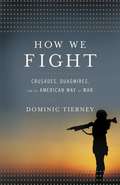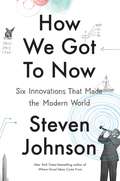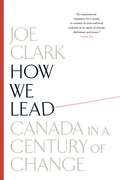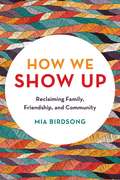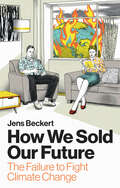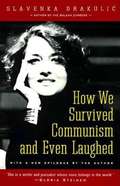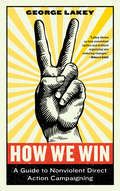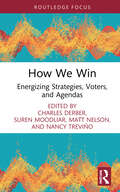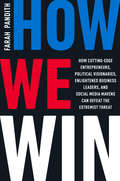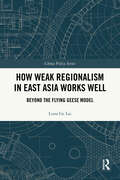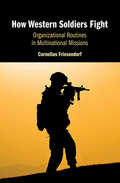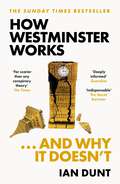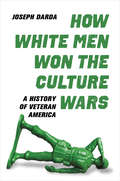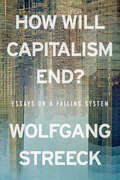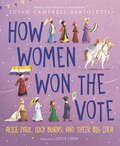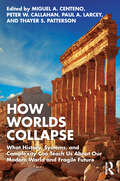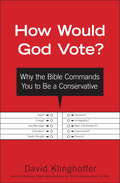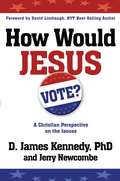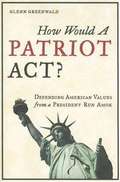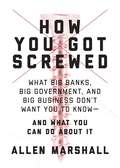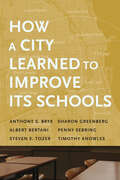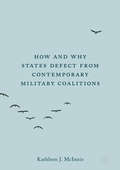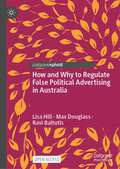- Table View
- List View
How We Fight: Crusades, Quagmires, and the American Way of War
by Dominic TierneyAmericans love war. We've never run from a fight. Our triumphs from the American Revolution to World War II define who we are as a nation and a people. Americans hate war. Our leaders rush us into conflicts without knowing the facts or understanding the consequences. Korea, Vietnam, and now Iraq and Afghanistan define who we are as a nation and a people. How We Fight explores the extraordinary doublemindedness with which Americans approach war, and reveals the opposing mindsets that have governed our responses throughout history: the "crusade" tradition-our grand quests to defend democratic values and overthrow tyrants--and the "quagmire" tradition--our resistance to the work of nation-building and its inevitable cost in dollars and American lives. How can one nation be so split? Studying conflicts from the Civil War to the present, Dominic Tierney has created a secret history of American foreign policy and a frank and insightful look at how Americans respond to the ultimate challenge. And he shows how success is possible. His innovative model for tackling the challenges of modern war can mean longstanding victory in Iraq and Afghanistan, by rediscovering a lost American warrior tradition.
How We Got to Now: Six Innovations That Made the Modern World
by Steven JohnsonFrom the New York Times-bestselling author of Where Good Ideas Come From and Everything Bad Is Good for You, a new look at the power and legacy of great ideas. In this illustrated volume, Steven Johnson explores the history of innovation over centuries, tracing facets of modern life (refrigeration, clocks, and eyeglass lenses, to name a few) from their creation by hobbyists, amateurs, and entrepreneurs to their unintended historical consequences. Filled with surprising stories of accidental genius and brilliant mistakes--from the French publisher who invented the phonograph before Edison but forgot to include playback, to the Hollywood movie star who helped invent the technology behind Wi-Fi and Bluetooth--How We Got to Now investigates the secret history behind the everyday objects of contemporary life. In his trademark style, Johnson examines unexpected connections between seemingly unrelated fields: how the invention of air-conditioning enabled the largest migration of human beings in the history of the species--to cities such as Dubai or Phoenix, which would otherwise be virtually uninhabitable; how pendulum clocks helped trigger the industrial revolution; and how clean water made it possible to manufacture computer chips. Accompanied by a major six-part television series on PBS, How We Got to Now is the story of collaborative networks building the modern world, written in the provocative, informative, and engaging style that has earned Johnson fans around the globe.
How We Lead: Canada in a Century of Change
by Joe ClarkA passionate argument for Canada's reassertion of its place on the world stage, from a former prime minister and one of Canada's most respected political figures. In the world that is taking shape, the unique combination of Canada's success at home as a diverse society and its reputation internationally as a sympathetic and respected partner consititute national assets that are at least as valuable as its natural resource wealth. As the world becomes more competitive and complex, and the chances of deadly conflict grow, the example and the initiative of Canada can become more important than they have ever been. That depends on its people: assets have no value if Canadians don't recognize or use them, or worse, if they waste them. A more effective Canada is not only a benefit to itself, but to its friends and neighbours. And in this compelling examination of what it as a nation has been, what it has become and what it can yet be to the world, Joe Clark takes the reader beyond formal foreign policy and looks at the contributions and leadership offered by Canada's most successful individuals and organizations who are already putting these uniquely Canadian assets to work internationally.
How We Show Up: Reclaiming Family, Friendship, and Community
by Mia BirdsongAn Invitation to Community and Models for ConnectionAfter almost every presentation activist and writer Mia Birdsong gives to executives, think tanks, and policy makers, one of those leaders quietly confesses how much they long for the profound community she describes. They have family, friends, and colleagues, yet they still feel like they're standing alone. They're "winning" at the American Dream, but they're lonely, disconnected, and unsatisfied.It seems counterintuitive that living the "good life"--the well-paying job, the nuclear family, the upward mobility--can make us feel isolated and unhappy. But in a divided America, where only a quarter of us know our neighbors and everyone is either a winner or a loser, we've forgotten the key element that helped us make progress in the first place: community. In this provocative, groundbreaking work, Mia Birdsong shows that what separates us isn't only the ever-present injustices built around race, class, gender, values, and beliefs, but also our denial of our interdependence and need for belonging. In response to the fear and discomfort we feel, we've built walls, and instead of leaning on each other, we find ourselves leaning on concrete.Through research, interviews, and stories of lived experience, How We Show Up returns us to our inherent connectedness where we find strength, safety, and support in vulnerability and generosity, in asking for help, and in being accountable. Showing up--literally and figuratively--points us toward the promise of our collective vitality and leads us to the liberated well-being we all want.
How We Sold Our Future: The Failure to Fight Climate Change
by Jens BeckertFor decades we have known about the dangers of global warming. Nevertheless, greenhouse gas emissions continue to increase. How can we explain our failure to take the necessary measures to stop climate change? Why are societies, despite the mounting threat to ourselves and our children, so reluctant to take action?In this important new book, Jens Beckert provides an answer to these questions. Our apparent inability to implement basic measures to combat climate change is due to the nature of power and incentive structures affecting companies, politicians, voters, and consumers. Drawing on social science research, he argues that climate change is an inevitable product of the structures of capitalist modernity which have been developing for the past 500 years. Our institutional and cultural arrangements are operating at the cost of destroying the natural environment and attempts to address global warming are almost inevitably bound to fail. Temperatures will continue to rise and social and political conflicts will intensify. The tragic truth is: we are selling our future for the next quarterly figures, the upcoming election results, and today’s pleasure. Any realistic climate policy needs to focus on preparing societies for the consequences of escalating climate change and aim at strengthening social resilience to cope with the increasingly unstable natural world. Civil society is the only source of pressure that could build the necessary strength and support for climate protection.How We Sold Our Future is a crucial intervention into the most pressing issue of our time.
How We Survived Communism & Even Laughed
by Slavenka Drakulic"I clearly remember when it all began. Just before he retired, a journalist colleague returned from the Austria-Hungary border in mid-September 1989, crying with excitement. 'East Germans are crossing the border by the thousand. I didn't think I would ever live to see this!' Neither did I. That is how you are trained...to fear change, so that when change eventually begins to take place, you are suspicious, afraid...because every change...was always for the worse." excerpt from Introduction.
How We Win: A Guide to Nonviolent Direct Action Campaigning
by George LakeyA lifetime of activist experience informs this playbook for building and conducting nonviolent direct action campaignsBeginning as a trainer in the civil rights movement of the 1960s, George Lakey has been on the front lines of social change for decades. Now, in this timely and down-to-earth guide, he passes the torch to a new generation of activists hitting the streets. He looks to successful campaigns across the world to help us see what has worked and what hasn’t: from choosing the right target, to designing a creative campaign; from avoiding burnout within your group, to building a movement of movements to achieve real progressive victories. Drawing on the experiences of a diverse set of ambitious change-makers, How We Win shows us the way to justice, peace, and a sustainable economy. This is what democracy looks like.
How We Win: Energizing Strategies, Voters, and Agendas (Universalizing Resistance)
by Charles Derber, Suren Moodliar, Matt Nelson, and Nancy TreviñoThis book uniquely demonstrates how a new combination of communities, progressive visions, and strategies provides a path to defeat fascist machinations and strengthens social justice movements. Taking the incredible twists and turns of elections as a given, the book takes the issues, grievances and solutions of social movements as its grounding.Would-be change agents, be they first-time voters, freshly minted activists, impacted communities, or veteran strategists, will find answers to questions of voting, organizing, and mobilization. In doing so, readers will find answers to activating their networks and communities not merely to vote, but how to build on their “Emergency Election” mobilizing and power-building efforts to win their agendas, regardless of who holds office.This theoretically and empirically informed handbook for activists, voters, their organizations, unions, and communities provides both mobilizing tools and talking points about the elections’ most vital and contested issues.
How We Win: How Cutting-Edge Entrepreneurs, Political Visionaries, Enlightened Business Leaders, and Social Media Mavens Can Defeat the Extremist Threat
by Farah Pandith“Drawing on her decades of experience, Pandith unweaves the tangled web of extremism and demonstrates how government officials, tech CEOs, and concerned citizens alike can do their part to defeat it.” – Former Secretary of State Madeleine K. AlbrightThere is a war being fought, and we are losing it. Despite the billions of dollars spent since 9/11 trying to defeat terrorist organizations, the so-called Islamic State, Al Qaeda, and other groups remain a terrifying geopolitical threat. In some ways the threat has grown worse: The 9/11 hijackers came from far away; the danger today can come from anywhere—from the other side of the world to across the street. Unable to stem recruitment, we seem doomed to a worsening struggle with a constantly evolving enemy that remains several steps ahead of us. Unfortunately, current policies seem almost guaranteed not to reduce extremist violence but instead to make it easier for terrorists to spread their hateful ideas, recruit new members, and carry out attacks. We actually possess the means right now to inoculate communities against extremist ideologies. In How We Win, Farah Pandith presents a revolutionary new analysis of global extremism as well as powerful but seldom-used strategies for vanquishing it. Drawing on her visits to eighty countries, the hundreds of interviews and focus groups she’s conducted around the world, and her high-level experience in the Bush and Obama administrations, Pandith argues for a paradigm shift in our approach to combat extremism, one that mobilizes the expertise and resources of diplomats, corporate leaders, mental health experts, social scientists, entrepreneurs, local communities, and, most of all, global youth themselves. There is a war being fought, and we can win it. This is how.
How Weak Regionalism in East Asia Works Well: Beyond the Flying Geese Model (ISSN)
by Luna Ge LaiThis book investigates the reasons why regionalism in East Asia has been much weaker than in Western Europe and North America. It focuses particularly on economic factors, examining the regional and global linkages of production networks.Through a focused exploration of regional and global production networks, it argues that East Asia was not as regionally concentrated as was Western Europe or North America, lacking a regionally oriented productional basis to support the institutional arrangement of East Asia as a stand-alone economic community. Moreover, the regional production networks of each national economy in the region are influenced by a different set of value-added components from different global and regional origins. This divergence in their positions accounts for the mushrooming of divergent initiatives and projects for regional institutional arrangement. Finally, the institutional choices of the states to join Comprehensive and Progressive Agreement for Trans-Pacific Partnership (CP/TPP) and/or Regional Comprehensive Economic Partnership (RCEP) are found to be strongly influenced by the sectoral focuses and priorities of their economies.Demonstrating how the unique economic factors of each nation override other considerations for greater regional integration, this book will be a valuable resource to students and scholars of international trade, Asian politics and economics.
How Wealth Rules the World: Saving Our Communities and Freedoms from the Dictatorship of Property
by Ben G. PriceCrackdowns on local democracy are accelerating, as corporate and state interests continue efforts to repress social movements. In this well-timed book, Ben Price presciently reveals structures of power and law that facilitate blatant corporate supremacy in the United States. Price uses his years of experience as a community organizer and a careful reading of history to show how a legal paradigm that facilitated slavery and the fossil fuel economy has endured and adapted over time – today barricading our communities and squelching dissent.Many books have been written about wealth, power and politics in the United States. Most of them make intuitive sense. Wealthy people use their power to influence and control politics. But Ben Price's new book is often counterintuitive as he explores how wealth itself is imbued with power. He answers questions such as:How is the American Legislative Exchange Council – a modern states' rights, free market capitalist group – the intellectual and political descendant of George Washington's Federalist Party?How was the Fourteenth Amendment that emancipated African American slaves from their status as property used by a reactionary Supreme Court to grant legal "personhood" to private corporations?How are cities seen under our legal doctrine as "public corporations," devoid of real governing authority?Further, Price identifies key counterrevolutions in U.S. history that squelched the transformative potential of the Civil War and American Revolution, and traces the roots of colonial and imperial systems of control. He links them to modern "free trade" agreements and other antidemocratic structures used to supersede democracy to this day.For some, this will come as no surprise. For others, it will be a rude, though necessary, awakening. "The white man's municipalities are just reservations, like ours," said a resident of Pine Ridge Reservation, who Price spoke with. "The difference is, we know we live on reservations. The white man doesn't."Crucially, Price shares insight into how social movements can plant seeds of a new legal system that makes the liberty, civil rights and dignity of humans and ecosystems its ultimate purpose. In fact, he introduces the reader to people who are doing just that.
How Western Soldiers Fight: Organizational Routines in Multinational Missions
by Cornelius FriesendorfIn contemporary missions, soldiers often face unconventional opponents rather than enemy armies. How do Western soldiers deal with war criminals, rioters, or insurgents? What explains differences in behavior across military organizations in multinational missions? How does military conduct impact local populations? Comparing troops from the United States, Britain, Germany, and Italy at three sites of intervention (Bosnia, Kosovo, and Afghanistan), this book shows that militaries in the field apply idiosyncratic organizational routines. Friesendorf uses the concept of routines to explain, for example, why US soldiers are trigger-happy, why British soldiers patrol on foot, and why German soldiers avoid risk. Despite convergence in military structures and practices, militaries continue to fight differently, often with much autonomy. This bottom-up perspective focuses on different routines at the level of operations and tactics, thus contributing to a better understanding of the implementation of military missions, and highlighting failures of Western militaries to protect civilians.
How Westminster Works . . . and Why It Doesn't: The instant Sunday Times bestseller from the ultimate political insider
by Ian DuntWhy do some prime ministers manage to get things done, while others miserably fail? What is a 'special adviser' and how did they take over British political life? And why is the House of Lords more functional than most people think?Most of us have a sense that our political system doesn't seem to work, but struggle to articulate exactly why. And for good reason: our political and financial institutions are cloaked in secrecy, archaic terminology, ancient custom and impenetrable jargon. Now, expert political journalist Ian Dunt is lifting the lid on British politics to expose every aspect of the setup in a way that can be understood and challenged. From Downing Street to Whitehall, the Commons to the Lords, this book is an indispensable guide to our political system - and how we might begin to fix it.
How Westminster Works . . . and Why It Doesn't: The instant Sunday Times bestseller from the ultimate political insider
by Ian DuntWhy do some prime ministers manage to get things done, while others miserably fail? What is a 'special adviser' and how did they take over British political life? And why is the House of Lords more functional than most people think?Most of us have a sense that our political system doesn't seem to work, but struggle to articulate exactly why. And for good reason: our political and financial institutions are cloaked in secrecy, archaic terminology, ancient custom and impenetrable jargon. Now, expert political journalist Ian Dunt is lifting the lid on British politics to expose every aspect of the setup in a way that can be understood and challenged. From Downing Street to Whitehall, the Commons to the Lords, this book is an indispensable guide to our political system - and how we might begin to fix it.
How White Men Won the Culture Wars: A History of Veteran America
by Joseph DardaReuniting white America after Vietnam. "If war among the whites brought peace and liberty to the blacks," Frederick Douglass asked in 1875, peering into the nation’s future, "what will peace among the whites bring?" The answer then and now, after civil war and civil rights: a white reunion disguised as a veterans’ reunion. How White Men Won the Culture Wars shows how a broad contingent of white men––conservative and liberal, hawk and dove, vet and nonvet––transformed the Vietnam War into a staging ground for a post–civil rights white racial reconciliation. Conservatives could celebrate white vets as deracinated embodiments of the nation. Liberals could treat them as minoritized heroes whose voices must be heard. Erasing Americans of color, Southeast Asians, and women from the war, white men could agree, after civil rights and feminism, that they had suffered and deserved more. From the POW/MIA and veterans’ mental health movements to Rambo and "Born in the U.S.A.," they remade their racial identities for an age of color blindness and multiculturalism in the image of the Vietnam vet. No one wins in a culture war—except, Joseph Darda argues, white men dressed in army green.
How Will Capitalism End?: Essays on a Failing System
by Wolfgang StreeckOne of the &“Best Books of the Year&”: Guardian • Financial Times • Times Higher Education A major collection of essays that questions whether contemporary capitalism will end with a bang or a whimper—from a leading political economist and the author of Buying Time. After years of ill health, capitalism is now in a critical condition. Growth has given way to stagnation; inequality is leading to instability; and confidence in the money economy has all but evaporated. In How Will Capitalism End?, the acclaimed analyst of contemporary politics and economics Wolfgang Streeck argues that the world is about to change. The marriage between democracy and capitalism, ill-suited partners brought together in the shadow of World War II, is coming to an end. The regulatory institutions that once restrained the financial sector&’s excesses have collapsed and, after the final victory of capitalism at the end of the Cold War, there is no political agency capable of rolling back the liberalization of the markets. Ours has become a world defined by declining growth, oligarchic rule, a shrinking public sphere, institutional corruption and international anarchy, and no cure to these ills is at hand.
How Women Won the Vote: Alice Paul, Lucy Burns, and Their Big Idea
by Susan Campbell BartolettiThis is how history should be told to kids—with photos, illustrations, and captivating storytelling.From Newbery Honor medalist Susan Campbell Bartoletti and in time to celebrate the 100th anniversary of women's suffrage in America comes the page-turning, stunningly illustrated, and tirelessly researched story of the little-known DC Women’s March of 1913.Bartoletti spins a story like few others—deftly taking readers by the hand and introducing them to suffragists Alice Paul and Lucy Burns. Paul and Burns met in a London jail and fought their way through hunger strikes, jail time, and much more to win a long, difficult victory for America and its women.Includes extensive back matter and dozens of archival images to evoke the time period between 1909 and 1920.
How Worlds Collapse: What History, Systems, and Complexity Can Teach Us About Our Modern World and Fragile Future
by Miguel A. Centeno, Peter W. Callahan, Paul A. Larcey, Thayer S. PattersonAs our society confronts the impacts of globalization and global systemic risks—such as financial contagion, climate change, and epidemics—what can studies of the past tell us about our present and future? How Worlds Collapse offers case studies of societies that either collapsed or overcame cataclysmic adversity. The authors in this volume find commonalities between past civilizations and our current society, tracing patterns, strategies, and early warning signs that can inform decision-making today. While today’s world presents unique challenges, many mechanisms, dynamics, and fundamental challenges to the foundations of civilization have been consistent throughout history—highlighting essential lessons for the future.
How Would God Vote?
by David KlinghofferFromHow Would God Vote? "The Bible commands a style of politics that in the American context could only be described as deeply conservative. Is, then, the politics of God theocratic? "A strong case could be made for theocracy, American-style, if the word were defined not in the conventional way but according to its root meaning. Democracy signifies the rule of thedemos, the people. Strictly speaking, theocracy means the rule not of churches or priests but oftheos, God. It won't do to deny that many conservatives, even while unambiguously affirming the traditional American separation of church and state, would add moretheosto the democratic mix than is currently the case. I choose not to call myself a theocrat because I know how eager liberal secularists would be to twist the word against me. Dishonestly they would make it appear that I wish to impose a literal biblical theocracy, that I would dumbly imitate word for word the political structure of king, priesthood, and religious high court that existed in biblical antiquity. "Yet, in a subtler sense, are we not all theocrats now?" This startlingly original investigation into the controversies dividing America provides a clear and convincing affirmation of the relevance of the Bible to contemporary politics. With liberals and conservatives alike claiming the authority of the Bible as support for their views on social and moral issues, the need to understand what the Bible actually says has never been more pressing. InHow Would God Vote?, journalist and scholar David Klinghoffer illuminates the worldview set forth in the Scriptures and argues that, with some exceptions, the God of the Bible would overwhelmingly support traditionally conservative principles and policies. Klinghoffer considers the ethical and moral heart of contemporary political debates--questions like immigration, gay marriage, abortion, care for the poor, war and peace, censorship, privacy, the place of religion in schools and the community, and much more. There is a pattern here. It's for a very good reason that conservatives line up as they do, predictably, on a range of issue; as do liberals. The two competing political philosophies derive from radically different ways of looking at the world: one in consonance with the Bible, the other very much not. Klinghoffer, however, is no stereotypical Republican. Controversially, he argues that the Bible would have us emphasize domestic policy, the classic pre-9/11 culture war issues, over a hyped-up "World War IV" against "Islamofascism. " The Bible has a foreign policy, he shows, and it is not neoconservative. He demonstrates support in the Scriptures for a welcoming attitude toward immigrants, for gun control, and for affirmative action. The Bible, Klinghoffer shows, is no mere list of dos and don'ts but a fully coherent and practically relevant portrait of moral reality, compelling and deep enough to guide not only our private but our public lives. Even if we as individuals fail its private tests, that's no reason to reject its public lessons. To anyone who takes God seriously, every election poses a radical question: Will we vote with Him, or against Him? The Bible is an unapologetically political book, Klinghoffer explains, and an extremely conservative one. Some political views offend God, and those views are mostly liberal. In short, the Bible commands you to be a conservative. Stimulating and provocative,How Would God Vote'is an important contribution to pre-election debates and to setting the path the nation will follow in the future under a new president.
How Would Jesus Vote?: A Christian Perspective on the Issues
by D. James Kennedy Jerry NewcombeThe 2008 election is shaping up to be one of the most important political contests in American history. In fact, Dr. D. James Kennedy believes it will be a watershed moment that could impact our very survival as a nation under God. Values voters-people whose political views and votes are based on their faith in God-are being targeted as never before. As we move forward in the campaign season, the significant players will debate terrorism, radical Islam, nuclear threats, global warming, social issues, gay marriage, immigration, education, health care, and many other essential issues that can create sharp ideological divisions. Into this overwhelmingly complex political situation, Dr. Kennedy and Jerry Newcombe bring a clear, compelling, and nonpartisan exploration of what God's Word has to say on these critical matters. How Would Jesus Vote'isn't intended to tell you which candidates to support; rather it offers you a Christ-centered understanding of the world to help you draw your own political conclusions. This election, don't cast an uninformed vote that fails to reflect your values. Instead, learn how to apply your faith and obedience to God to your ballot. This timely, helpful, and hopeful book will enable you to do just that.
How Would a Patriot Act?: Defending American Values From a President Run Amok
by Glenn Greenwald[From the cover] Glenn Greenwald was not a political man. Not liberal, not conservative. To his thinking, the United States was generally on track and would remain forever centrist. But all that has changed. Over the past five years, a creeping extremism has taken hold of our federal government that is threatening to alter our system of government and our national character. This extremism is neither conservative nor liberal in nature, but is instead driven by the Bush administration's radical theories of presidential power. How Would A Patriot Act? is one man's story of being galvanized into action to defend our Constitution, and a penetrating analysis of what is at stake. If we are to remain true to America's founding principles, we cannot abide President Bush's claims of unlimited and unchecked power. Because when you answer to no one, you're not a president. You're a despot. In the spirit of the colonists who once mustered the strength to denounce a king, Greenwald asks: How would a patriot act today?
How You Got Screwed: What Big Banks, Big Government, and Big Business Don't Want You to Know—and What You Can Do About It
by Allen MarshallIf you’re like most people, you want nothing more than a fair shot in life: a chance to seek out opportunities, work hard, and make your own way in this world. But as author Allen Marshall explains in How You Got Screwed, the game has been rigged, making it almost impossible for you to win. How You Got Screwed explains exactly how the rules have been made to favor those in charge. Consider the financial system, which steals your earning power with money that doesn’t hold its value and lets banks break the law practically without consequence. Think about our politicians, who serve their donors and lobbyists, and a government more interested in serving itself than its people. And remember big business, which uses its money and political power to twist the rules in their favor, hurting you as a consumer, employee, and citizen.Yes, the cards are stacked against you. But that’s only if you play by their rules. It’s time to play your own game—and How You Got Screwed is your guide to making the system work for you.
How a City Learned to Improve Its Schools (Continuous Improvement in Education Series)
by Anthony S. Bryk Steven E. Tozer Sharon Greenberg Albert Bertani Penny Sebring Timothy KnowlesA comprehensive analysis of the astonishing changes that elevated the Chicago public school system from one of the worst in the nation to one of the most improved. How a City Learned to Improve Its Schools tells the story of the extraordinary thirty-year school reform effort that changed the landscape of public education in Chicago. Acclaimed educational researcher Anthony S. Bryk joins five coauthors directly involved in Chicago&’s education reform efforts, Sharon Greenberg, Albert Bertani, Penny Sebring, Steven E. Tozer, and Timothy Knowles, to illuminate the many factors that led to this transformation of the Chicago Public Schools. Beginning in 1987, Bryk and colleagues lay out the civic context for reform, outlining the systemic challenges such as segregation, institutional racism, and income and resource disparities that reformers grappled with as well as the social conflicts they faced. Next, they describe how fundamental changes occurred at every level of schooling: enhancing classroom instruction; organizing more engaged and effective local school communities; strengthening the preparation, recruitment, and support of teachers and school leaders; and sustaining an ambitious evidence-based campaign to keep the public informed on the progress of key reform initiatives and the challenges still ahead. The power of this capacity building is validated by unprecedented increases in benchmarks such as graduation rates and college matriculation. This riveting account introduces key actors within the schools, city government, and business community, and the partnerships they forged. It also reveals the surprising yet essential role of Chicago's innovative information infrastructure in aligning disparate initiatives. In making clear how elements such as advocacy, civic capacity, improvement research, and strong democracy contributed to large-scale progress in the system's 600-plus schools, the book highlights the greater lessons that the Chicago story offers for system improvement overall.
How and Why States Defect from Contemporary Military Coalitions
by Kathleen J. McInnisThis book identifies contemporary military coalition defections, builds a theoretical framework for understanding why coalition defection occurs and assesses its utility for both the scholarly and policy practitioner communities. Drawing upon the author’s own experiences managing the Afghanistan coalition for the Pentagon, the volume builds a relevant policy and practical understanding of some of the key aspects of contemporary coalition warfare. Ultimately, it concludes that coalition defection is prompted by heightened perceptions of political and military risk. Yet the choice of how to defect— whether to completely withdraw forces or instead find another, less risky way to participate—is largely a function of international and alliance pressures to remain engaged.
How and Why to Regulate False Political Advertising in Australia
by Lisa Hill Max Douglass Ravi BaltutisThis open access book represents the first comprehensive, Australia-focused treatment of the problem of false election information disseminated for the purpose of gaining an electoral advantage. It explores cautious legal regulation as the most effective and decisive approach to the issue. In doing so, the book demonstrates that, although experiments with such remedies have met with mixed success elsewhere, they are nevertheless viable, especially in Australia where they have strong public support and are able to withstand constitutional challenge.
